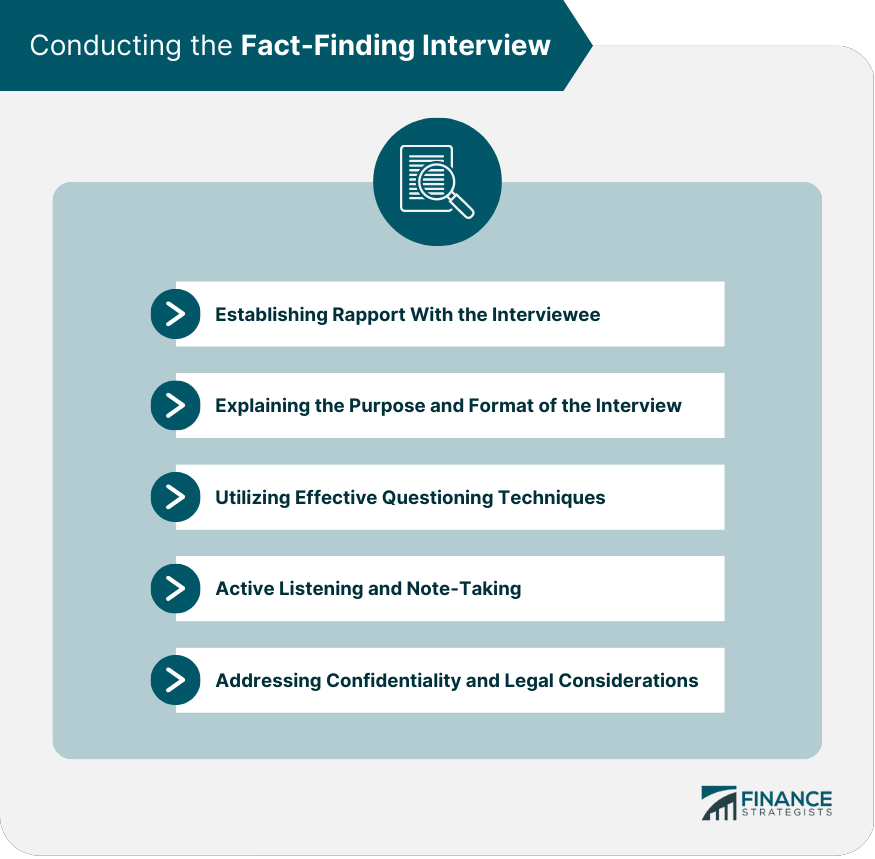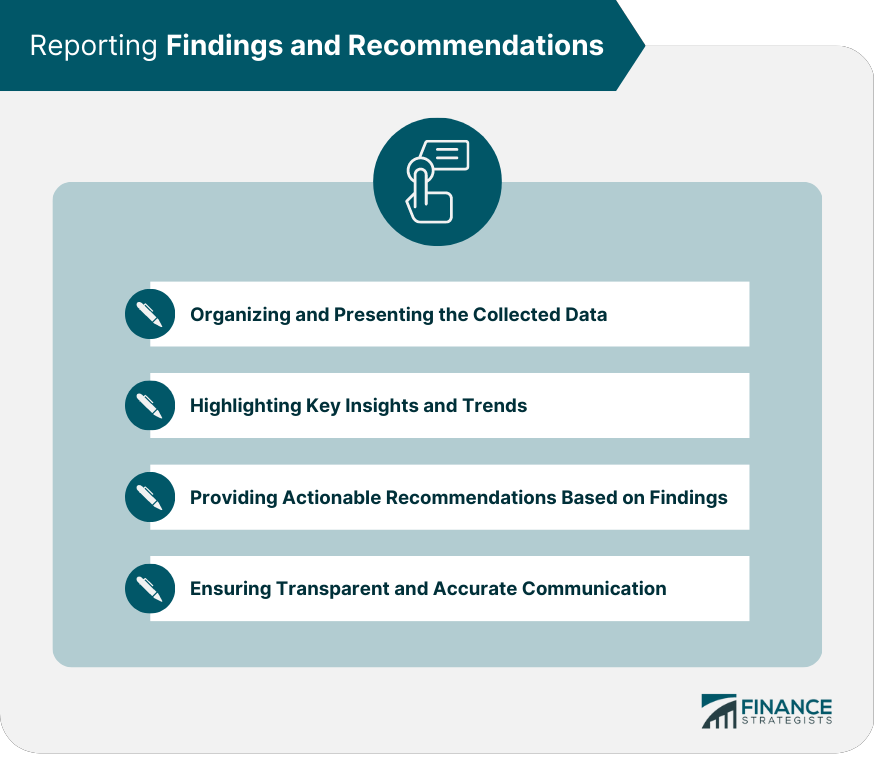A fact-finding interview in finance is a process where an interviewer collects information from a client about their financial situation, including their goals, risk tolerance, and investment experience. The interview is conducted to understand the client's financial needs, so that the advisor can recommend the most appropriate financial products and services to help the client meet their goals. The interview may cover a range of topics, such as income, expenses, assets, liabilities, and investment preferences. The information gathered during the fact-finding interview is used to create a personalized financial plan that is tailored to the client's specific needs and objectives. The first step in preparing for a fact-finding interview is to define the objectives and scope of the interview. Determine the specific information you need and how it relates to your overall financial project or investigation. This clarity helps ensure that the interview stays focused and efficient. Before conducting the interview, research the interviewee and their organization. Understand their role, responsibilities, and expertise to tailor your questions accordingly. Familiarizing yourself with their background can also help establish rapport during the interview. Create a list of relevant questions to guide the interview. Prioritize open-ended questions that encourage the interviewee to provide detailed answers, and supplement these with more specific, closed-ended questions as needed. Organize your questions logically, and be prepared to adjust them as the conversation unfolds. Coordinate with the interviewee to schedule a suitable time and location for the interview. Ensure that the chosen setting is comfortable, quiet, and free from distractions to facilitate open communication. Begin the interview by introducing yourself and establishing rapport with the interviewee. This can help put them at ease and foster a more open and honest conversation. Clearly communicate the purpose and format of the interview to the interviewee. Provide an overview of the topics you plan to discuss and any confidentiality or legal considerations. Use open-ended questions to encourage the interviewee to provide in-depth responses. These questions often begin with "how," "why," or "tell me about," and allow for a more comprehensive exploration of the topic at hand. Probing questions help you delve deeper into a specific area or clarify the interviewee's responses. These questions often follow an open-ended question and focus on specific details, examples, or explanations. Closed-ended questions typically require a "yes" or "no" answer or a specific piece of information. Use these questions judiciously to confirm details or narrow down a topic. As the interview progresses, practice active listening and take detailed notes. This enables you to accurately capture the interviewee's responses and identify any areas that require further clarification. Ensure that both you and the interviewee are aware of any confidentiality or legal considerations that may apply. This includes discussing any non-disclosure agreements, data privacy policies, or other relevant legal requirements. After the interview, review your notes and transcripts to ensure their accuracy and completeness. Identify key insights and patterns, as well as any inconsistencies or gaps in the information provided. Compare the information gathered during the interview with other available sources. This can help you validate the accuracy of the data and provide additional context. If discrepancies or gaps in the information emerge, consider conducting follow-up interviews or seeking additional sources to address these issues. Organize and present the collected data in a clear and accessible format. Identify and emphasize the key insights and trends that emerged during the interview process. Make connections between the interview findings and your broader financial investigation or project to ensure that your analysis is meaningful and actionable. Based on the findings of the fact-finding interviews, develop a set of actionable recommendations for your organization or client. These recommendations should be practical, well-supported, and aligned with the objectives of the financial project or investigation. When sharing your findings and recommendations, prioritize transparency and accuracy. Clearly communicate the sources of your information, any limitations or uncertainties, and the rationale for your recommendations. Fact-finding interviews can be time-consuming and resource-intensive. To maximize efficiency, prepare thoroughly, develop a focused list of questions, and utilize effective questioning techniques. When discussing sensitive topics or potential conflicts of interest, approach the conversation with tact and professionalism. Be transparent about your intentions and objectives, and respect the interviewee's boundaries. To minimize bias and ensure objectivity, be aware of your own assumptions and preconceptions. Approach the interview with an open mind, and be willing to revise your understanding based on new information. Each interviewee may have their own communication style and personality. Be prepared to adapt your questioning techniques and approach to accommodate these differences and facilitate a productive conversation. In mergers and acquisitions, fact-finding interviews help assess the target company's financial health, operational processes, and potential risks. This information is essential for evaluating the viability and value of the deal. Fact-finding interviews play a critical role in auditing and compliance investigations, providing insights into an organization's financial practices, internal controls, and adherence to regulations. In financial fraud and forensic accounting cases, fact-finding interviews help uncover fraudulent activities, identify responsible parties, and gather evidence for legal proceedings. Market research and competitor analysis often rely on fact-finding interviews to gain insights into customer preferences, market trends, and competitors' strategies. This information can inform strategic decision-making and support business growth. Fact-finding interviews are a valuable tool in the financial sector, enabling professionals to gather essential information for decision-making and analysis. By preparing thoroughly, utilizing effective questioning techniques, and adapting to different interview styles and contexts, financial professionals can conduct successful fact-finding interviews that support their organization's objectives.What Is a Fact-Finding Interview?
Preparation for Fact-Finding Interviews
Identifying Objectives and Scope
Researching the Interviewee and Organization
Developing a List of Relevant Questions
Scheduling and Logistics
Conducting the Fact-Finding Interview
Establishing Rapport With the Interviewee
Explaining the Purpose and Format of the Interview
Utilizing Effective Questioning Techniques
Open-Ended Questions
Probing Questions
Closed-Ended Questions
Active Listening and Note-Taking
Addressing Confidentiality and Legal Considerations

Analyzing and Validating Information
Reviewing Notes and Transcripts
Cross-Referencing Information With Other Sources
Identifying Discrepancies and Gaps in Information
Reporting Findings and Recommendations
Organizing and Presenting the Collected Data
Highlighting Key Insights and Trends
Providing Actionable Recommendations Based on Findings
Ensuring Transparent and Accurate Communication

Common Challenges and Best Practices
Overcoming Time and Resource Constraints
Navigating Sensitive Topics and Conflicts of Interest
Ensuring Objectivity and Minimizing Biases
Adapting to Different Interview Styles and Personalities
Fact-Finding Interviews in Different Financial Contexts
Due Diligence for Mergers and Acquisitions
Auditing and Compliance Investigations
Financial Fraud and Forensic Accounting
Market Research and Competitor Analysis
Conclusion
Fact-Finding Interview FAQs
A fact-finding interview in the financial sector is a process where an interviewer gathers information about a client's financial situation, including their goals, risk tolerance, and investment experience. The interview is conducted to determine the best financial products and services that suit the client's needs.
A fact-finding interview is important in the financial sector because it helps financial advisors understand their clients' financial situation, including their goals, risk tolerance, and investment experience. This information helps the advisor recommend the most suitable financial products and services to help the client meet their financial objectives.
During a fact-finding interview in the financial sector, the interviewer should ask questions about the client's financial situation, such as their income, expenses, debts, and assets. Additionally, the interviewer should ask about the client's investment objectives, risk tolerance, and investment experience to determine the best financial products and services for the client.
Fact-finding interviews in the financial sector are typically conducted by financial advisors, wealth managers, or financial planners. These professionals have the necessary knowledge and experience to ask the right questions and provide the best financial advice to their clients.
The duration of a fact-finding interview in the financial sector varies depending on the complexity of the client's financial situation. A simple interview can last around 30 minutes, while a more complex interview can take up to two hours. It is essential to allocate enough time for the interview to ensure that all relevant information is collected to make appropriate financial recommendations.
True Tamplin is a published author, public speaker, CEO of UpDigital, and founder of Finance Strategists.
True is a Certified Educator in Personal Finance (CEPF®), author of The Handy Financial Ratios Guide, a member of the Society for Advancing Business Editing and Writing, contributes to his financial education site, Finance Strategists, and has spoken to various financial communities such as the CFA Institute, as well as university students like his Alma mater, Biola University, where he received a bachelor of science in business and data analytics.
To learn more about True, visit his personal website or view his author profiles on Amazon, Nasdaq and Forbes.















